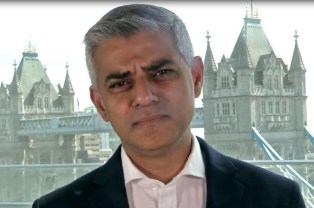The Mayor of London Sadiq Khan has tweeted a message I struggle to understand offhand: “African cultures have shaped London into the vibrant city it is today.”

I’m convinced that a man occupying such an important post would never utter an unfounded statement. And, as a multiculturalist of lifelong standing, I sincerely hope Mr Khan is right.
Hence, if queried, he’ll doubtless be able to produce ample support for his assertion. My point is that such support is necessary because some naysayers, especially those whose commitment to multiculturalism is less robust than mine, may question Mr Khan’s veracity.
Especially pedantic reactionaries might even argue that the mayor’s statement is more correct politically than factually.
There are also a couple of semantic points worth pondering. First, the underlying assumption seems to be that vibrancy is an invariably desirable characteristic.
But is it really? The public at a football match is considerably more vibrant than at a classical concert, but the latter group is less likely to have a mass brawl after – or perhaps even during – the proceedings.
Closer to the business at hand, the annual Notting Hill carnival is hard to beat for vibrancy, yet last year it featured a stabbing and 30 assaults on police. De gustibus… and all that, but on balance some people may feel that vibrancy just may have its downside.
Then there’s the implicit suggestion that, before a massive influx of people from Africa and the West Indies, London had been a stagnant cultural backwater with no vibrancy whatsoever. Multiculturalists like me will welcome this notion, but they’d have a hard time finding historical proof for it.
Quite the contrary, London has been one of the world’s cultural centres for centuries, with magnetic attraction for outlanders like Holbein, Rubens, Van Dyck, Handel, Haydn and Mozart (who was stopped from emigrating to London only by his untimely death).
And when in the 1960s the word ‘culture’ acquired – laudably! – a broader meaning than in those staid times, the city got to be known as ‘Swinging London’, not ‘Sleepy London’.
Yet one struggles to recall a black, much less specifically African, input to that development that can even remotely match Carnaby Street, mods and rockers, the miniskirt, Twiggy, the King’s Road, Jean Shrimpton, the Rolling Stones and other rather monochromatic icons.
There were black singers like Shirley Bassey and Cleo Laine, but only a Ku Klux Klan Grand Dragon would regard those gifted British women as culturally African. Miss Laine did sing much jazz, but she was no more African than her husband and co-performer John Dankworth.
I’ve now lived in London for 31 years, yet other than once being driven out of a West Indian restaurant by its deafening reggae din, I don’t recall ever coming in contact with any African culture, even, as in that case, at one remove.
One man’s experience is always limited, but one’s power of observation and ability to absorb statistical data are less so. Activating those faculties, and sharing information with friends and acquaintances, I can’t detect any noticeable African component in London’s cultural life.
This saddens me no end, for every political instinct in my soul screams that it can’t, shouldn’t be so.
I’m even more upset by the demographic breakdown of crime statistics. But before we plunge into those, I must state emphatically and almost hysterically that race has nothing to do with a propensity to commit crimes.
As a multiculturalist of lifelong standing, I’m convinced that black people are disproportionately represented in crime statistics not because of any failing on their part, but because of racial discrimination, poverty that’s no fault of their own, Tory austerity in general and Margaret Thatcher in particular.
It’s with this understanding and a heavy heart that one finds out that, according to the latest data available, though blacks make up just over 13 per cent of London’s population, they account for most men accused of violent crimes.
According to the Metropolitan Police Service, blacks represent 54 per cent of those accused of mugging; for robbery, that proportion stands at 58 per cent; and for gun crimes, 67 per cent.
I’m sure that this isn’t the cultural vibrancy Mr Sadiq Khan had in mind, but there’s no denying its high amplitude.
Then of course there’s also the most unfortunate olfactory aspect: it’s mostly heavily ethnic areas of London that display graphic signs banning public defecation and urination. The need for such signage in the King’s Road or even Carnaby Street apparently hasn’t yet arrived.
This is simply an observation, for which I’m sure there must be a perfectly innocuous explanation. But it’s off the topic, for bodily functions tend to be rather static and with little potential for vibrancy.
In fact, everything I’ve written here is either a personal observation or an implicit request for our mayor to clarify his point by answering the question in the title.
Otherwise, even I, the founder, chairman and so far the only member of the Charles Martel Society for Multiculturalism, can get terribly confused.
Mayors of many towns often describe their patches as ‘vibrant’ and ‘bustling’. The first describes the effect of the pounding of the roads by heavy trucks and the honking of emergency vehicles. Bustling is a good word for the effect of people bumping into one another on congested footpaths. The effect of the occasional frozen African stowaway thumping on to the ground beneath airport flight paths is trivial by comparison.
Yes, but it does add a certain frisson to vibrancy.
“African cultures have shaped London into the vibrant city it is today.”
OH YES it has. And for the worse too.
What is it with these left wing politicians wearing the suit coat with the shirt unbuttond and no tie? That seems to be the uniform now of the leftist politician. “I am so relaxed.”